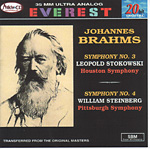The Brahms Third is one of those Stokowski performances wherein the conductor seeks to “improve” the score by subjecting it to a number of alterations of his own divising. Thus, we hear high octave string doublings in the first movement, a dovetailed trio and clipped note values in the third, and sustained dimenuendos at the conclusion of all four movements. Rather than enhancing Brahm’s work, these tinkerings tend to draw attention to themselves, or more precisely, to the conductor, who already makes his prescence undeniable through his extreme tempo shifts in the first movement (which the Houston Symphony pulls off without a sweat). If Brahms is less important to you than Stokowski, then this recording will satisfy.
William Steinberg’s Brahms Fourth, by contrast, is a straightforward account that impresses through its bracing forward pulse and vibrant energy. And while Steinberg’s light approach doesn’t really project the music’s grim power at the conclusion of the first movement and finale, the performance remains enjoyable for its freshness, and the excellent playing of the Pittsburgh Symphony. Both recordings offer bright and clear sound, with only the limited dynamics revealing their age.
































